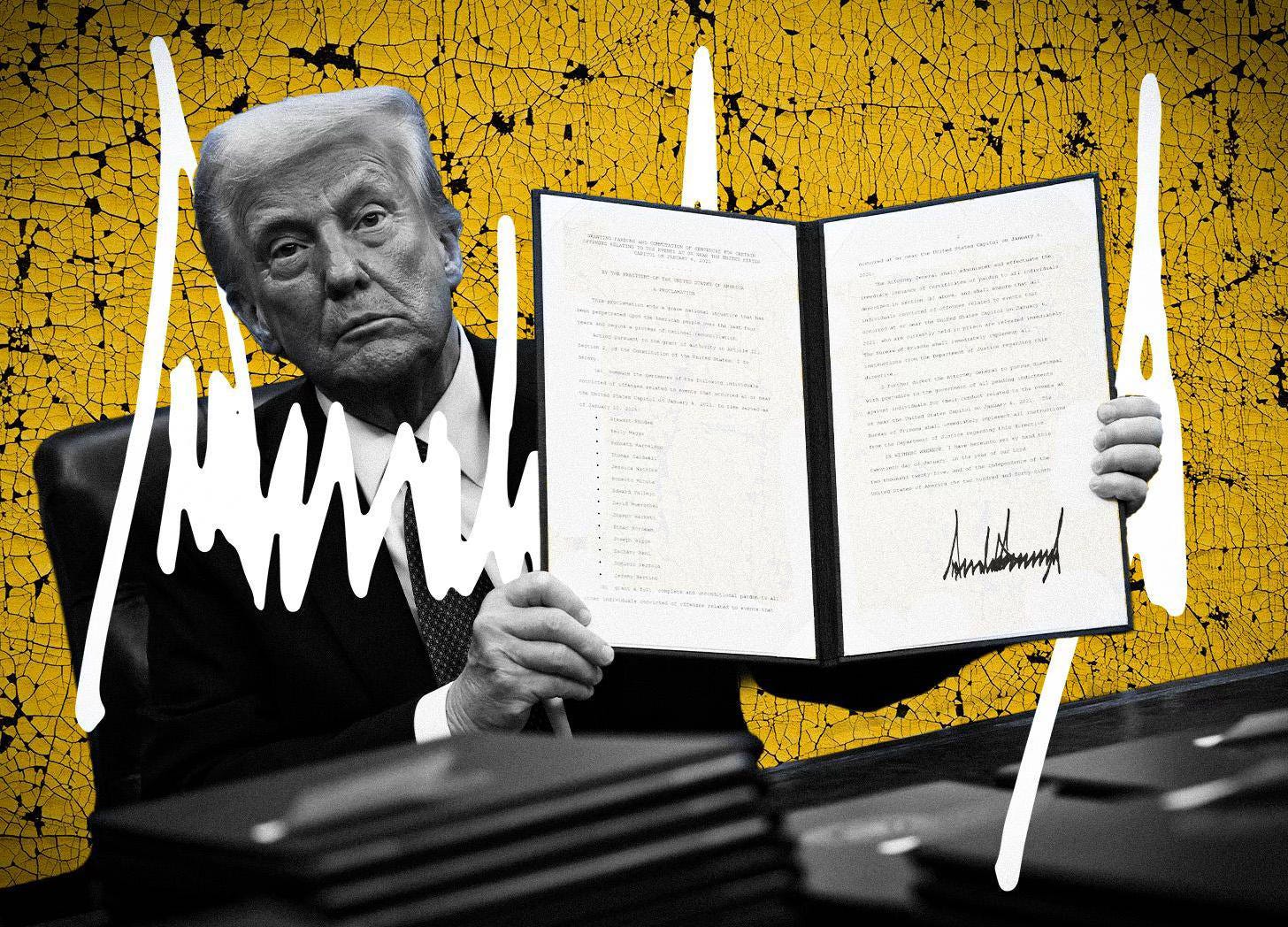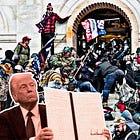Congress Can Toughen Existing Laws to Expose Trump’s Pardon-for-Sale Racket
The Supreme Court’s immunity ruling gave presidents a free pass for corruption, but Congress can still demand transparency
Since the U.S. Supreme Court’s unconscionable decision in Trump v. United States, the so-called immunity ruling that essentially sanctioned American presidents using official power to commit crimes without any penalty, the legal perversions coming out of the White House have been legion. So far, Donald Trump’s actions, along with the Supreme Court’s endorsement of them, have effectively kneecapped the First, Fourth, and Fifth Amendments, the Appointments, Spending, and Emoluments Clauses, the 14th Amendment’s ban on holding office after having engaged in insurrection, Article I’s vesting of legislative power in Congress, and Congress’s power to lay and collect tariffs. Trump is acting this way because he no longer has any incentive not to.
In that immunity ruling, a 6-3 majority held that the exercise of “core” powers under Article II of the Constitution is absolutely immune from legal oversight, even if used criminally, and that lesser “official actions” are presumptively immune unless prosecutors can show that criminally confining a presidential act would pose no “dangers on the authority and functions of the Executive Branch.” The majority worried that “[p]otential criminal liability, and the peculiar public opprobrium that attaches to criminal proceedings,” could “distort presidential decision-making.”
The threat of rogue prosecutors was thus top-of-mind for Chief Justice John Roberts, who wrote the majority opinion. Deviant presidents? Not so much. That ruling has practically invited the current president to use the massive power of the Department of Justice and the FBI to punish his political “enemies”—including former FBI Director James Comey, New York Attorney General Letitia James, institutes of higher education, major media outlets, and top-tier law firms.
But it’s Trump’s exploitation of presidential pardon power that stands out as particularly insulated from accountability. On his first day in office, Trump pardoned over 1,500 individuals who were convicted of crimes pertaining to the attempted Jan. 6 insurrection, many of them violent. Nearly 10 months later, on Nov. 15, he pardoned a Jan. 6 defendant for a separate conviction involving illegal possession of six firearms and 4,800 rounds of ammunition who, prosecutors said, had “plans ... for a broader American civil war.” He also pardoned a woman convicted of threatening to shoot FBI agents investigating the insurrection at the Capitol. These were foreseeable pardons—Trump, after all, described the Capitol rioters “J-6 patriots.”
Also this month, Trump issued a “proclamation” that pre-emptively issued a blanket pardon to anyone involved in the 2020 fake electors scheme. He listed a slew of individuals by name who were embroiled in prosecutions as a result of state-law investigations, even though the Article II pardon power is limited to federal crimes and cannot affect state crimes. While these pardons are at this point largely symbolic, they could have the effect of barring a future administration from bringing federal charges against these individuals.
Immunity = Impunity
In the immunity ruling, Roberts cited a landmark 1952 Supreme Court case to justify his expansive interpretation of “core” powers and declared that the presidential power to pardon federal crimes is “conclusive and preclusive,” thus “disabling the Congress from acting upon the subject.” Because the pardon power is “core,” wrote Roberts, neither Congress nor the courts can control or hamper a president’s “discretion in exercising such authority.” But this also means that the Trump ruling effectively creates a shield for one of the most concerning types of pardon imaginable: one given in exchange for a bribe. And Trump has been no slouch in availing himself of it.
Since January, Trump has issued a number of pardons that reek of quid pro quos. In April, he pardoned Paul Walczak,who was convicted of tax fraud, shortly after his mother paid $1 million to attend a Mar-a-Lago fundraising dinner. In October, he pardoned Changpeng Zhao, billionaire founder of the cryptocurrency company Binance, who spent months in prison on federal money-laundering charges. World Liberty Financial, the Trump family’s crypto venture, facilitated a $2 billion investment in Binance which, according to Cornell economics professor Eswar Prasad, “looks like a quid pro quo” to the extent that it shows the Trump administration is “willing to use the U.S. government machinery to support the Trump family’s crypto-related interests.” With the pardon, Zhao can now do business again in the U.S.
It is clear that in the wake of the immunity ruling, the pardon power has become a crucial instrument of corruption for the Trump administration. But here is what Congress could—and should—do to discourage a pardons-for-sale racket.
Immunity Ruling: Exempting Presidential Corruption
Both Congress and the DOJ have long assumed that pardons-for-bribes are criminal. When Bill Clinton pardoned Marc Rich (a former hedge-fund manager who evaded federal authorities for 17 years on charges of tax evasion, wire fraud, and racketeering), the Senate Judiciary Committee launched an investigation after discovering that Rich’s ex-wife, Denise Rich, had donated $450,000 to the Clinton presidential library. In late 2020, the DOJ investigated a potential bribery-for-pardon scheme involving the Trump White House. And at Bill Barr’s confirmation hearing for attorney general under Trump, Sen. Patrick Leahy (D-Vt.) asked, “Do you believe a president could lawfully issue a pardon in exchange for the recipient’s promise to not incriminate him?” Barr responded, “No. That would be a crime.”
Now that the Court has ruled that pardons are “core,” though, it’s difficult to see how prosecutors could successfully bring such a case. Proving such a crime would involve showing both an actus reus (“guilty act”) and a mens rea (“guilty mind”). In Trump v. U.S., the conservative majority made prosecutions of former presidents virtually impossible on both counts, holding that evidence of a president’s use of “core” or “official” power—the actus reus—cannot be used in a prosecution. Evidence of a corrupt state of mind—the mens rea—is off the table, too.
The federal bribery statute makes it a crime for (1) a public official (2) to request, receive, or be offered or promised (3) a thing of value (4) for the benefit of the official (5) to influence the public official or induce them to act or omit an act that is connected to their official duties (6) “corruptly,” meaning with the intention that the official abuse their official position.
A president is obviously a public official (step 1). If the president receives or is offered money—as a campaign contribution, for example, or as a donation towards a presidential library after an incumbent leaves office (steps 2 through 4)—in order to induce the president to pardon someone (step 5) with a corrupt intent (step 6), the president would, in theory, be guilty of the crime of bribery.
But the immunity decision wipes out steps 5 and 6 from the equation, because step 5 is the official act of the pardon (which the majority said is off limits in a prosecution), and step 6 is the mens rea, or the president’s state of mind (which the majority also removed from the prosecutorial toolkit).
In a concurring opinion that took issue with this aspect of the ruling, Justice Amy Coney Barrett warned that excluding “any mention” of the official act in a bribery prosecution “would hamstring the prosecution.” Roberts retorted that “of course the prosecutor may point to the public record to show the fact that the President performed the official act,” but “[w]hat the prosecutor may not do, however, is admit testimony or private records of the President or his advisors probing the official act itself.” Roberts’s response ignored the obvious truth that it’s impossible to prosecute a crime that requires a showing of mens rea now that the court has banned any evidence of mens rea in a prosecution of a former president.
Yet that is precisely the point of mens rea. In many instances, it’s only those actions taken for the wrong reasons that amount to crimes. Buying a ski mask for your holiday trip is one thing. Buying it to participate in a bank robbery with your friends is another. Only the latter is a crime, because the reason for it—the mental state, or mens rea—converts it from a benign act to one that the law criminally prohibits.
Roberts’s response is disturbing for another reason: he assumes that the official act will somehow inevitably make its way to the public record so that prosecutors can use it—rather than being exposed through secret grand jury testimony, for example. But the records of pardon decisions are mostly secret—although Trump’s astonishing candor about how he’s using the pardon power may be changing that.
Congress Should Require Transparency
So what, if anything, can be done about pardons-for-bribes?
If and when Congress is released from Trump’s grip, the legislature can step up in at least two ways. The first reform entails amending the Lobbying Disclosure Act (LDA) to specifically cover lobbying for pardons. The second reform would involve amending the Freedom of Information Act (FOIA) to make clear that the records of pardon decisions—including communications from or to anyone seeking to influence the process or final decision—must be available for public scrutiny.
Both reforms could, in theory, be struck down by the Supreme Court’s conservative majority applying Trump v. U.S. But because these transparency-oriented reforms would not actually restrict presidents’ ability to pardon, they should pass constitutional muster.
Enacted under Clinton in 1995, the LDA requires lobbyists to register with the clerk of the House of Representatives and the secretary of the Senate and also to file periodic reports. The law requires registration and disclosure—it doesn’t limit lobbying activities themselves, which are protected under the First Amendment’s right “to petition the Government for a redress of grievances.”
Nothing in the LDA exempts lobbying for pardons from its requirements. So, people who lobby presidents for favors must comply with the federal lobbying restrictions. If they meet the requisite thresholds, pardon lobbyists should register and file reports of their efforts to secure clemency for individuals convicted of federal crimes.
This isn’t currently happening, for at least two possible reasons.
One: LDA violations are rarely prosecuted, which means that a cadre of “shadow lobbyists” engage in lobbying activities but figure that they won’t be held accountable for failing to register, making a mockery of the existing law. Two: Some simply fall below the activity thresholds set forth in the LDA even if they are in fact engaging in lobbying. With no costs for non-compliance and big financial rewards for scoring access for their clients, lobbyists have no meaningful incentive to comply with the law. That must change.
The Jack Abramoff lobbying scandal, which involved a high-profile congressional lobbyist who was convicted of conspiracy and fraud for duping his own clients, was the first-ever criminal conviction under the LDA. It also prompted Congress to strengthen the law further. The Honest Leadership and Open Government Act of 2007 made it a crime for members of Congress or their employees to take or withhold an official act “with the intent to influence, on the basis of partisan political affiliation, an employment decision or employment practice of any private entity.” The criminal provisions of the LDA do not currently apply to outsiders’ lobbying of presidents, however; any attempt to extend the law to cover lobbying-related crimes by presidents would bump up against the Supreme Court’s ruling in Trump v. U.S.
Congress could further amend the LDA to capture lobbying for pardons—even extending its criminal prohibitions to apply to pardons conditioned on some reciprocal action by a private entity. But shining a national spotlight on this issue would first require the U.S. Attorney’s Office for the District of Columbia, which enforces the statute, to step up its LDA investigations and bring enough cases to deter lobbyists from skirting the rules. It’s fair to assume that the current U.S. Attorney for D.C., Trump loyalist Jeanine Pirro, is not going to do anything that would call into question Trump’s pardons. Just before leaving office on Jan. 20, 2021, Trump pardoned her ex-husband, Albert Pirro Jr., who had served time on tax evasion and conspiracy charges.
Expand FOIA to Pardon-Related Executive Decisions
Congress could also amend FOIA to make public the federal records relating to pardon decisions, matching the policies of several states that require a statement of the reasons for clemency decisions. Historically, the DOJ has refused to produce pardon-related records on the theory that the FOIA exempts “deliberative communications pertaining to agency and presidential decision-making as confidential,” which the DOJ interprets to include pardon decisions. As a result, the record of federal pardons is officially withheld from the public, unless a president specifically decides otherwise.
Courts have held that pardon documents that are actually “solicited and received” by the president or his immediate White House advisers who have “broad and significant responsibility for investigating and formulating the advice to be given the President” are privileged. The rationale behind the deliberative process privilege is that the law should protect “candid, objective, and even blunt or harsh opinions” by presidents because, as the Supreme Court has recognized, “[a] President and those who assist him must be free to explore alternatives in the process of shaping policies and making decisions and to do so in a way many would be unwilling to express except privately.”
The deliberative process privilege is hard to square with pardons, however, which do not implicate national policy—unless they amount to amnesty, which entails pardons of large categories of people, like those convicted of low-level marijuana offenses or Vietnam War draft-dodgers. For individual pardons and commutations (which shorten sentences but do not “forgive” the underlying crime), the rationale behind a presidential privilege makes little sense.
The deliberative process privilege rests on the premise that federal officials won’t communicate candidly if they think their communications will be aired publicly, and that this “chilling” effect could ultimately harm the American people. But the original purpose behind the pardon power has to do with mercy for individuals caught up unjustly in the criminal justice system, which is itself meant to honor our constitutional commitment to due process and transparency, not issue an open invitation for corruption. A presidential pardon overrides the determination by judges and juries that, based on the evidence, an individual is guilty of a crime and should be sentenced to a particular term in prison, should pay a monetary penalty, should be banned from certain actions, or should even be sent to death. The underlying factual determinations for those convictions and sentencings are all made on the record, but the pardon process is allowed to remain secret.
The deliberative process privilege, like criminal immunity for presidents, is a “law” that was entirely made up—by judges. To suggest that Congress, which is endowed with the power to make laws under Article II of the Constitution, cannot pass a statute tweaking the policy determinations the Supreme Court manufactured for the executive branch is hard to square with the Framers’ articulation of the respective powers of the three branches.
If nothing else, the Supreme Court in Trump v. U.S. put the Constitution through a historic stress test. So far, our founding charter is failing. By gifting Trump criminal immunity, then inviting him to issue unaccountable pardons in exchange for personal goodies, the majority set the stage for widespread corruption in the White House using Article II’s unparalleled levers of power. A president can now commit crimes, knowing there’s no accountability on the other side, and simply pardon any accomplices. That is not what the Framers had in mind. Congress must step in, while American democracy still remains on life support, and stop the constitutional carnage the Supreme Court majority began.
A previous version of this essay was first published in The UnPopulist in 2024.
© The UnPopulist, 2025
Follow us on Bluesky, Threads, YouTube, TikTok, Facebook, Instagram, and X.
We welcome your reactions and replies. Please adhere to our comments policy.











What congress? THIS congress??
@Kim Wehle
"Congress Can Toughen Existing Laws to Expose Trump’s Pardon-for-Sale Racket
The Supreme Court’s immunity ruling gave presidents a free pass for corruption, but Congress can still demand transparency"
You folks expend a lot of energy sniveling about the behavior of "right wing" folks and ignore the behavior of "left wing" folks. Both wings are wings of the same bird, progressivism, an ideology that government folks are best qualified to resolve personal concerns.
Where were you when the Bidet issued a bunch of pardons just before leaving office? Your apparent problem with the Dump is that it patched over to the Republican party to run for Puppet-in-Chief. If the Dump had retained membership in the Democrat party, you probably would be OK with its behavior.